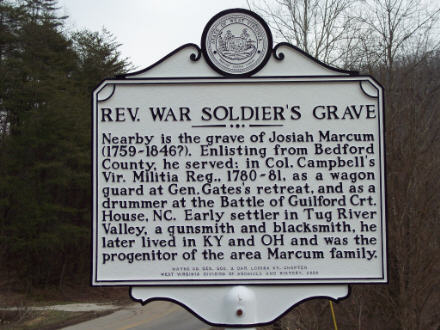
Historical data - Josiah Marcum
On behalf of my Marcum ancestors, I welcome you to this
celebration to honor and recognize my Revolutionary War Ancestor, Josiah Marcum.
I am proud to claim Josiah Marcum through the John C. Marcum line, the “Miller”
Mose Marcum line, the Clara Marcum Kirk line, and the “Jingo” Jake line. When I
began this study of my family tree, I had no idea that I was related so many
ways to Josiah Marcum. I now know that the legend of naming the various groups
of people was because there were so many Marcums that the Lord told Adam to just
“Mark” them and let them go” This is how we got the name of Marcum. This was
just a hint of what the name would become. Because there are so many MARCUMS,
there had to be a multitude of nicknames. Some of these nicknames are: the
Bird-leg set, the Quillbacks, the Wiley set, Bullethead set, Bullwheel set,
Chugerowl set, Jingo set, Fluty-Marcums, Witcher Set, the Kirk-Marcums, the
Copley-Marcums, Miller Mose set, and others. To add a little more variety and
color to these nicknames, within a set there were other nicknames: There was a
“Shouting” Bill, Cotton Hill Bill, Bullet Head Bill, Jewelry Jake, Baltimore
Jake, Jingo Jake, Doctor Johnny, Big John, John Drake, John Duck, Big Earl,
Little Earl, Lee’s Earl, Spot Josh, Red Nose Josh, Big Dewey, Joe Witcher,
Catalogue George, and many other nicknames that may not be complimentary. We are
here to honor
BLACKSMITH or GUNSMITH JOSIAH MARCUM
From the writings of a local historian, musician, teacher and descendant of
Josiah Marcum, the late Jessie Baker, we find a world of information concerning
Josiah Marcum. The weathered gravestone which stands about a mile-and-a-half
from the mouth of Jennie’s Creek as one turns at the bridge from U. S. Route 52
South East of Crum, WV, reads as follows:
JOSIAH MARCUM
DRUMMER
CAMPBELL’S.
VA MIL. REV.
WAR
This solitary grave is located in a bottom near Jennie’s Creek surrounded by
quiet hills. It is one of the few marked Revolutionary War Soldier’s graves in
the Tug Valley.
The simple inscription on the rough gray stone tells little about this man who
lived during the founding years of our nation.
However, there is available from the past a most interesting document which
tells much about Josiah Marcum, the frontier colonial soldier of the American
Revolution.
On Nov 2, 1832, nearly 175 years ago, when Andrew Jackson was the seventh
president of the new nation, Josiah Marcum, then a man 73 years old, appeared in
person before the circuit court judge at Louisa, Lawrence County, Kentucky and
applied for a soldier’s pension.
His statements plus the supporting evidence of two witnesses supplement the
meager scraps of information found on the gravestone.
They also offer strong reminders of the stirring events and the treachery and
intrigue which marked the beginnings of the United States of America.
A review of American history supplies even more needed materials in the way of
facts and dates to fill in the interesting account as related by this man who
was born almost 250 years ago, when the American colonies were still under the
rule of the British Crown.
First, Josiah Marcum stated that he had been told by his parents that he was
born May 2, 1759, in Chesterfield County, Va., along the James River although he
had no written evidence to prove the date.
He continued that when but a child of four or five years, he moved to Prince
Edward County. While Josiah was yet a boy, the family moved further westward to
Bedford County where he grew to manhood and volunteered for service in the
Virginia Militia as an “18 months” soldier.
From Bedford, where he was enlisted, he was marched into North Carolina and was
in Gates’ Defeat “only a short time” after he entered the service.
He was a waggoner as well as a drummer and he explained that it was his duty to
drive a baggage wagon filled with supplies to the vicinity of the battle.
In his pension application, Josiah Marcum could not establish dates for any of
these happenings. But he knew, and stated repeatedly for emphasis that he
volunteered “in the spring immediately preceding the defeat of General Gates.”
That one statement speaks volumes to the American who cares to turn back the
pages of history to an account of the Revolution War years.
“Gates Defeat” at Camden, S. C. on Aug. 17, 1780, has been likened to “the
darkest hour before the dawn”, in the winning of the Revolution. Lord Cornwallis
demolished the American Army under General Gates. The Americans lost over 2,000
men while the British losses amounted to 734.
From his testimony, Josiah never forgot that retreat from Camden nor General
Gates either.
On Nov. 7, 1833, David Adkins, another Revolutionary War veteran, stated that he
saw Josiah Marcum at Hillsbourgh in North Carolina in the American Army.”
The first time he saw him, a part of the army was being marched out to a place
where one of the soldiers was to be whipped. Adkins and Marcum led the
procession with fife and drum.
Adkins further declared that he saw Josiah Marcum beating the drum in one of the
companies stationed at Hillsborough just before the defeat of General Gates.
Adkins as fifer, and Marcum with the drum were marched out with a portion of
the army together. But after they left Hillsborough, Adkins did not see him
again “to his recollection.”
Marcum stated that after the defeat of Gates he was marched back to Hillsborough
where headquarters were located for a portion of the army.
He spent the winter there and on scouting parties all the while continuing to
drive the baggage wagon and to beat the drum.
During this time he was in Campbell’s regiment under General Stephens who was in
charge of the “18 months” men.
Then, history tells that out of the defeat came victory. The American victory of
King’s Mountain came in October, 1780. By December of the same year General
Nathaniel Greene whose loyalty never was questioned, was sent to replace Gates
who was retired permanently in disgrace.
Then followed the Battle of Cowpens on Jan. 17, 1781 and the “Campaign of the
Rivers” in which General Greene played hide-and-seek with the Red Coats along
the headwaters of five flooded rivers up and down the Carolinas.
By March 15, 1781, when Cornwallis attacked the Frontier Army at Guilford
Courthouse, Greene held the line at Guilford after the British had chased the
frontiersmen all the way across North Carolina.
According to his pension declaration, Josiah Marcum held the line right along
with Greene after driving the baggage wagon along the back hill country.
By April of 1781, Cornwallis had moved north to Virginia and tried to Capture
Governor Jefferson on the way. The last strategies of war were to bring about
his historic surrender of Yorktown on Oct. 19, 1781.
Josiah Marcum could not recall the date but he knew when the war was over.
His 18 months of service was completed and he was discharged at Hillsborough
Courthouse “in the fall of the year.”
He well remembered that on his way home to Virginia, the fruit in the orchards
was ripe and “many people refused to let the soldiers have any.”
The remaining evidence in the pension declaration tells more of the happenings
of later life in the life of Josiah Marcum.
In Nov. 7, 1833, his son Stephen Marcum, then 48 years old, stated that he had
seen the discharge which his father received when he left the Revolutionary War.
It had been “almost 35 years ago” and he remembered well that the discharge
stated that his father had served the enlistment of 18 months.
Stephen, with another individual, examined the papers of his father looking for
the bill of sale of a Negro woman and found the discharge: and “they had some
conversation in relation to the Revolutionary War and the old man talked of
other times and told many anecdotes of things which happened whilst he was a
soldier.”
Adding another very human touch to the record, Josiah Marcum stated that his
discharged was signed by Captain Tate but “he had it washed up in his pockets
about 20 or 25 years ago.”
He repeated that he had no documentary evidence but gave the names of three
other veterans -- Silas Wooten, Edward Burgess, and David Adkins -- who knew of
his having been in the service.
His last statement was that the regiment to which he had attached was commanded
by Colonel Campbell.
“Campbell’s Regiment” is well known in Virginia history. Robert Campbell was a
famous Indian fighter before Governor Jefferson gave him a Colonel’s Commission
and authorized the formation of additional units to be attached to the brigade
of General William Campbell.
Many of these men who served also surveyed lands in Western Virginia. Josiah
Marcum was one of the few who settled in person and for many years had extensive
land holdings on both sides of Tug River in both Lawrence County in Kentucky and
Cabell (later Wayne) on the Virginia side.
He reared a large family. His descendants in ever-increasing numbers take their
places with all degrees of prominence, through all walks of life.
From local sources we add these final notes.
That Josiah Marcum passed from this life on March of 1846 a few weeks before his
87th birthday.
That for many years he was such an expert blacksmith and gunsmith that he was
known throughout the area as “The Vulcan of the Big Sandy Valley.” A review of
Hardesty’s History of Wayne County mentions the Silver Creek Church and many of
her early members. Among those mentioned are John and Clara (Marcum) Kirk, John
C. and Clara Marcum, Moses Marcum, Jacob and Rhoda Marcum, and Rebecca Marcum
Copley. Several of the descendants of Josiah Marcum are members of the Silver
Creek Church and are very active in the youth program, the choir, the ministry.
They are employed as teachers, bankers, coal miners, elected officials,
musicians, attorneys, merchants, and doctors. In conclusion, thank you Josiah
Marcum for such a proud heritage.
DEDICATION AND
UNVEILING
REVOLUTIONARY WAR SOLDIER MARKER
For JOSIAH MARCUM

HISTORIC MARKER DEDICATED
The activities began at 2:00 pm with the posting of colors by the American Legion Post 89, and the VFW Post 6103 of Louisa, Ky. The pledge of allegiance was led by Louise Crum Good, descendant of Josiah Marcum. The National Anthem was led by Herbert Dawson, who also served as master of ceremonies for the program. The invocation was given by Carl Columbus Marcum who is a descendent of Josiah Marcum through three different lines.
Doris Jude, President of the Wayne County Genealogical and Historical Society introduced officers: Vice President, James J. Goode, Secretary, Lois Goode, Treasurer, Howard Osburn, and Trustee, Herbert Dawson.
Dr. Charles Sammons, President of the Wayne County Commission then introduced
the dignitaries. Among those introduced were County Commissioner, Rick Wellman,
Wayne County Family Lawmaster and Attorney, Stephen R. Lewis, and George Mayhew,
representing Senator H. Truman Chafin. Other dignitaries introduced included
Mary Ellen Reid, Past Regent of the Louisa Kentucky DAR and a State officer of
the Kentucky Society of the Daughters of the American Revolution., Tom Galloway,
President of the General Andrew Lewis Chapter of the Sons of the American
Revolution of Huntington, WV and the current State President of the WV Society
of the Sons of the American Revolution.
The speaker for the dedication was Matt Stanley, Principal of Tolsia High
School. Matt, who is a direct descendant through four of the children of Josiah
Marcum, gave a very informative and patriotic presentation on the life of Josiah
Marcum. Herbert Dawson, retired music teacher from Mingo and Wayne Counties, led
the audience in the singing of “America the Beautiful.” The ceremony was
concluded with the benediction being given by Carter Williamson, retired
principal from Logan County, and a descendent of Josiah Marcum.
The audience of more than 100 joined in a motorcade to Jennie’s Creek for the
unveiling of the roadside marker by Carl Marcum, Doris Jude and Mary Ellen Reid.
The Honor Guard then gave the military honors with a 21 gun salute and taps. The
audience then returned to the Silver Creek Church for refreshments and
fellowship under the assistance of Lelon “Huff”& Louise Williamson. A show of
hands revealed that at least 75 percent of those present were Josiah Marcum
descendants.
The Wayne County Genealogical & Historical Society will attempt to erect
Revolutionary War Soldier Markers for all Revolutionary War Soldiers buried in
Wayne County. Funds for these markers come from private donations, with some
matching funds provided. These markers are constructed with the approval of the
West Virginia Department of Archives and are erected by the West Virginia
Department of Highways. The Society is currently accepting donations for markers
for Hezekiah Adkins, Adam Crum, Micajah Frazier and Samuel Hatton. The signs
will be erected in the order in which funding is completed. Other Revolutionary
Soldiers buried or believed to be buried in Wayne County include: Thomas
Chandler, Asher Crockett, Jesse Cyrus, and Lazarus Damron. Anyone who has
information of other Revolutionary Soldiers buried in Wayne County should notify
the Wayne County Genealogical & Historical Society at their Web Site:
http://members.citynet.net/wcghs
The society meets the second Thursday of each
month at the WCGHS Library in Wayne, WV at 7:00 pm. The genealogical library is
open each Thursday from 12 noon until 5:00 pm.
The Wayne County Genealogical & Historical Society wishes to express their
thanks to the Silver Creek Baptist Church for the use of the facilities for this
special occasion. Otis Dillon is the Pastor; James Ray Spaulding & Otis Lynn
Dillon are assistant Pastors.
Pictures by Howard Osburn
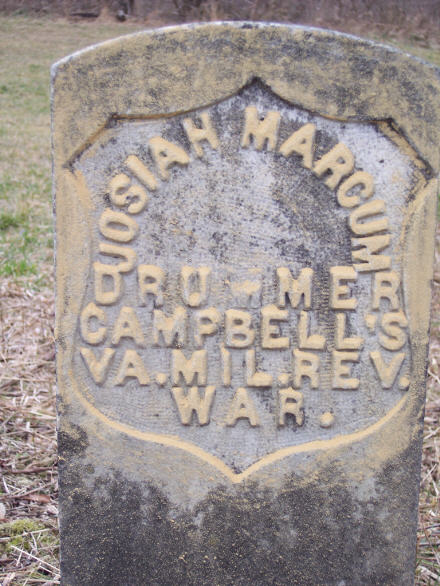
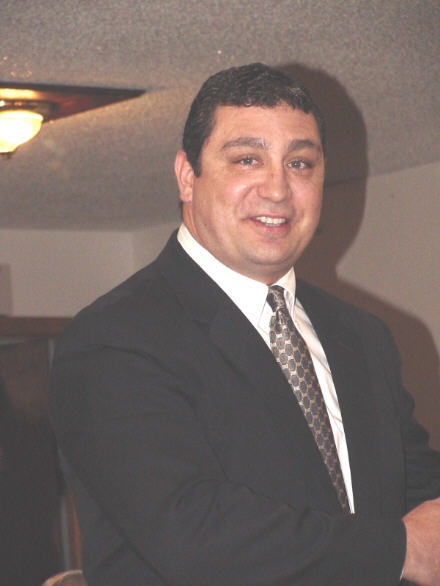
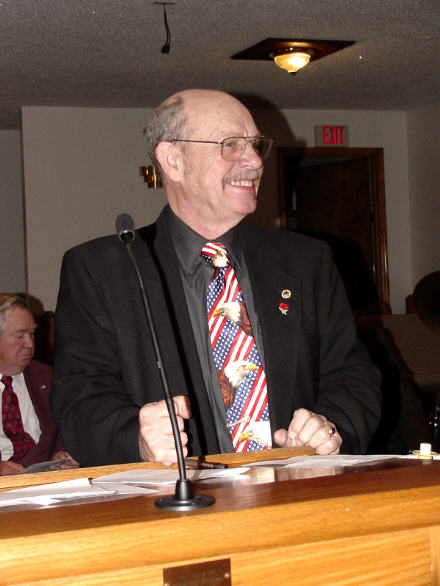
Herb Dawson Matt Stanley
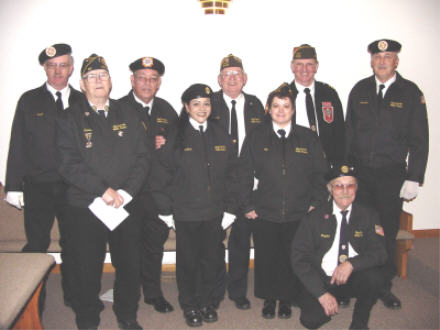
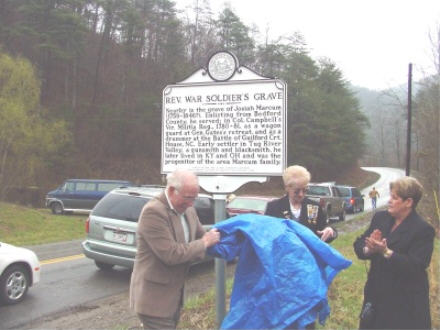
Unveiling of sign Honor Guard
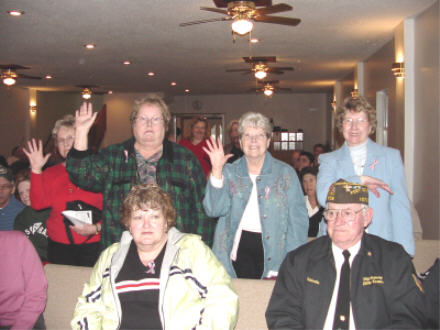
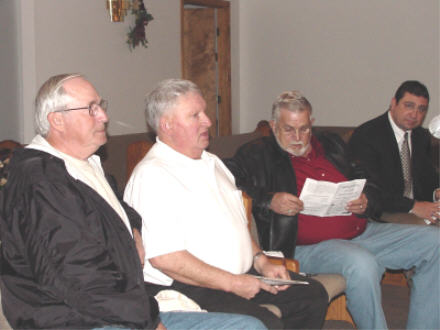
Marcum Ladies
Marcum Boys
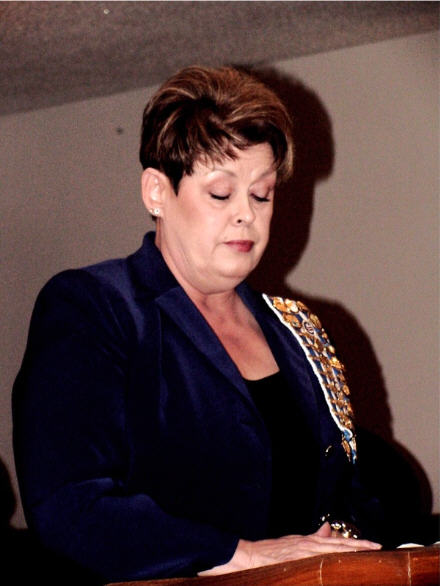
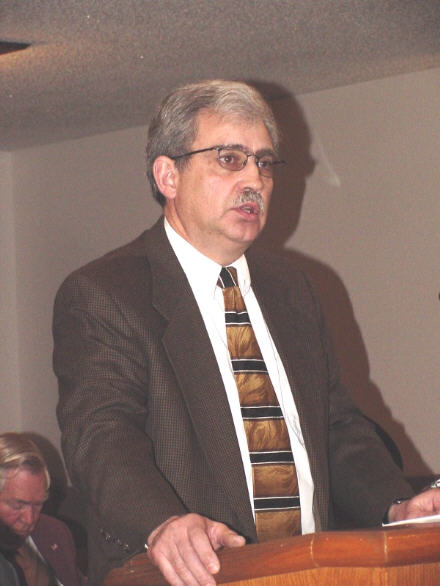
Dr. Charles Sammons Mary Ellen Reid